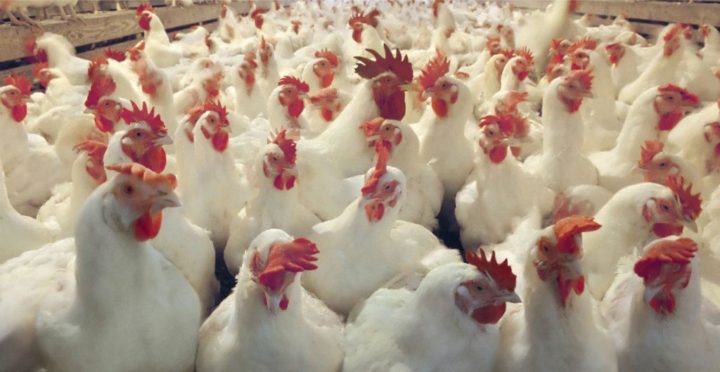The USDA is facing lawsuits for shirking its responsibility to protect birds from animal welfare violations.
By Dena Jones
The U.S. Department of Agriculture (USDA) was sued three times this past summer for shirking its responsibility to protect birds from egregious welfare violations and safeguard workers at slaughterhouses from injuries and the spread of the coronavirus.
Over the years, it has become abundantly clear that federal regulators not only let animal abusers off the hook but also placate the factory farm industry by subverting worker and consumer interests. On July 27, a growing number of animal advocacy organizations joined a lawsuit that challenged the USDA over its recent bird flu response plan, which indemnifies factory farms and fails to address how intensive confinement contributes to disease outbreaks. One day later, unions representing workers across six states sued the USDA over its approval of faster slaughter line speeds that they say will endanger workers.
In August, my organization, the Animal Welfare Institute (AWI), and Farm Sanctuary sued the USDA over its persistent failure to require humane handling of poultry at slaughter, resulting in damaged or contaminated products that violate the federal Poultry Products Inspection Act and compromise food safety and meat quality.
Our lawsuit comes after we initially petitioned the department in 2013 to uphold its congressional mandate and codify poultry humane handling standards into enforceable regulations. After six years, during which time federal inspectors documented more than 2,000 incidents of poultry mistreatment, the USDA denied our petition in 2019. At the same time, the department denied a second petition asking it to address the problemof birds being abandoned in the holding areas of slaughter plants—often in extreme heat or cold for extended periods.
Ongoing reviews of USDA enforcement records by AWI reveal that every year, government inspectors document the suffering of tens of thousands of birds from suffocation, blunt force trauma, and heat or cold stress before even reaching the slaughter line. This widespread suffering is entirely preventable, as it is caused by neglect, inadequate worker training, faulty equipment, and intentional acts of cruelty at slaughterhouses.
In 2018, for instance, Butterfield Foods Company failed to protect its hensduring their transportation to a Minnesota slaughter plant in subzero temperatures, resulting in nearly 10,000 deaths, with many birds frozen to their cages. More than 9,000 birds died in a similar incident at the same plant this past winter.
A Butterball plant in North Carolina held a truck of turkeys for 31 hours last year, depriving them of food and water. By the time they were unloaded, a large number of birds had perished, and some had begun cannibalizing weaker birds.
Each year, about 9 billion chickens and turkeys are slaughtered in the United States, yet plants suffer no consequences when most forms of mistreatment are observed during USDA audits. There are no fines, no slowing or stopping of the slaughter line, and no shuttering of a plant even if egregious or repeat violations occur.
For instance, a Jennie-O slaughter plant in Minnesota was written up 10 times in 2018 from February to August for severe injuries to turkeys, including large areas of torn skin, hemorrhaging and muscle mutilation—all due to malfunctioning equipment—yet the USDA did not penalize the plant or require operators to fix the problem.
Even incidents of willful mishandling are tolerated. At the Southern Hens facility in Mississippi, USDA inspectors cited the plant 10 times in the month of March 2020 alone because workers were seen tossing crates to the ground six feet below as the live birds inside frantically flapped their wings and tried to escape. This callous indifference not only causes stress, injuries and painful deaths for animals; it can also damage the final meat product for the consumer.
Under the Poultry Products Inspection Act, the USDA is required to reduce the incidence of damaged and/or potentially unsafe (or “adulterated”) poultry products. But while federal inspectors have issued official notices and directives drawing a connection between the mistreatment of live birds and adulteration, they have taken no concrete steps to stop it.
Instead, the USDA permits the poultry industry to police itself through voluntary standards that—based on the department’s own records—are clearly inadequate. Meanwhile, industry executives falsely claim that when inhumane handling occurs, government inspectors take action. Each side contends that the other is responsible for animal welfare. In reality, no one is protecting birds at slaughter.
The USDA has repeatedly demonstrated that it is unwilling to act against industry interests—even when doing so would improve poultry product quality and help prevent the abuse of the vast majority of land animals killed for food.
You can help protect birds at slaughter by sending a message to the USDA, asking the agency to change its regulations and policies to prevent neglect and abuse of birds at slaughter.
This article was produced by Earth | Food | Life, a project of the Independent Media Institute.
Dena Jones is the director of the Farm Animal Program for the nonprofit Animal Welfare Institute (AWI) in Washington, D.C. Since 1951, AWI has sought to alleviate suffering on animals inflicted by humans.






